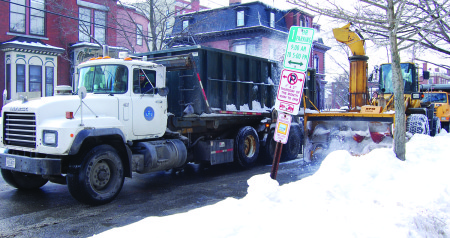January 27, 2016
Urban Conditional: How to survive a sidewalk; it is time to consider a single-plower system
by Zack Barowitz
 Walk like a penguin. If you lean forward, putting your weight on the front of part of your foot with each step, you won’t fall on your ass. Or get some urban crampons, those work, too; so do trekking poles. This is assuming that the sidewalk is icy. But if the sidewalk snow has not been removed at all (and is under two feet deep), you might need gaiters, and snowshoes. And then you’ll be fine if you are able bodied and not in too much of a rush. In any case, an uncleared sidewalk should be reported either on the Portland SeeClickFix app or the snow removal hotline 207.874.8793.
Walk like a penguin. If you lean forward, putting your weight on the front of part of your foot with each step, you won’t fall on your ass. Or get some urban crampons, those work, too; so do trekking poles. This is assuming that the sidewalk is icy. But if the sidewalk snow has not been removed at all (and is under two feet deep), you might need gaiters, and snowshoes. And then you’ll be fine if you are able bodied and not in too much of a rush. In any case, an uncleared sidewalk should be reported either on the Portland SeeClickFix app or the snow removal hotline 207.874.8793.
So be assured that with proper technique, the right equipment and access to technology you will be able to walk along (or at least report) the sidewalks that a property owner did not clear off.
Walking along a sidewalk shouldn’t be a matter of survival, but a fundamental principle of civilized life. It is a matter of public safety, mobility, public health, the environment and basic human dignity. For people without access to automobiles, sidewalk snow clearing is a social justice issue. And if you own a corner store or neighborhood business, it is an economic development issue — impassable sidewalks compel people to jump in their cars to drive to Hanaford for that quart of milk or roll of toilet paper rather than risking a slip on route to the neighborhood store.
Property owners in Portland have the legal obligation to shovel sidewalks (don’t forget to bend at the knees) or pay someone to clear it for them. A safe bet is to budget for 12 storms a season, says Robert Leeman, interim director of public works. So at 10 bucks a pop, one should expect to spend $120 cleaning up sidewalks after storms.
With that $120 figure in mind, it is time to consider a citywide single-plower system for sidewalk snow-clearing. Not only would a single-plower system guarantee comprehensive coverage and accountability, it would also provide a higher level of service than a shovel. Bobcats and similar equipment remove snow quickly and thoroughly, especially if they use a cylinder brush (great for brick sidewalks), snow blower and salt spreader attachment.
(And there are other technologies. Snow melters, despite being energy-intensive, save the high cost of hauling the snow to increasingly remote snow-dumps. Heated sidewalks have considerable installation and energy costs but they save on labor, slip-and-fall accidents, as well as on salting which contributes to the problem of the runoff of chemicals streaming into the waterways and treatment facilities).
A single-plower system could be paid for either out of the general fund (e.g., taxes) or from a frontage fee which is a charge assessed to all property owners (including nonprofits like Maine Medical Center) based on the length of sidewalk fronting their property.
Currently, the city of Portland plows sidewalks along designated school routes (paid out of the general fund) including the entire length of Congress Street, Brighton Avenue, Washington Avenue, Allen Avenue, Stevens Avenue, etc. About 85 miles in total.
Portland Downtown (the business improvement district) contracts with the Department of Public Works for a dizzying array of services which includes extensive snow removal from downtown sidewalks. Unfortunately a budget line item is elusive out of the panoply of services from the contract. However, the city of Rochester, N.Y. charges a frontage fees for a variety of services including a supplemental service to help property owners clear their sidewalks during substantial winter storms at a per property cost of about forty dollars a year. Tripling that figure would seem to account for complete seasonal service and brings the seasonal property cost back to one hundred-twenty dollar estimate. (Dense multi-unit dwellings would generally have a lower per-household cost than single unit dwellings.)
Considering that the imperatives are both moral and economic, and the costs nominal, we should adopt a citywide single-plower system to get rid of obstructed sidewalks once and for all. But if, on the other hand, you decide that you really hate both snow and sidewalks, you can always move to the Arizona Phoenix.